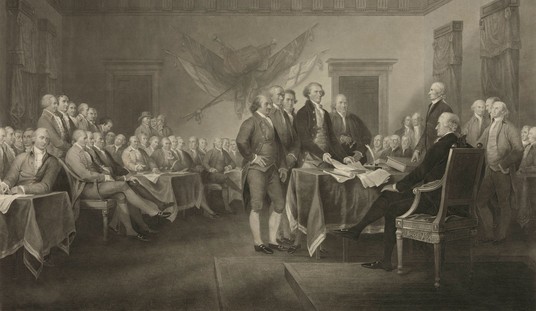Trade wars are breaking out all over the world right now. President Trump is not backing down on his tariff threats, now a reality. He campaigned on Making America Great Again, including manufacturing and industry, and he’s following through. Countries—and citizens—are scrambling to adjust.
The commentary class is protesting. The New York Post is clamoring for Trump to turn off the tariffs. The Wall Street Journal is not a big fan, either. In contrast, auto manufacturers, factory workers, and the general American public support Trump’s tariffs. His approval rating rose following the tariffs!
Republicans, and conservatives generally, have presented themselves as Free-Trade, Free-Market Friedmanites for a long time. Trump’s ascendancy has forced them to rethink (or at least tolerate) the tariff-protectionist discussion.
Many countries impose tariffs on us, and their economies are not failing. If tariffs are so bad, why are they getting away with it? Their citizens have good jobs and get good goods, too, but we Americans have witnessed our manufacturing and industrial base dwindle and disappear. How is this fair? How is this good for America?
A lot of the scaremongering neoliberal economists are missing some fundamental issues, too.
Milton Friedman mocked tariffs with an illustration: imagine three individuals in a boat, and one gets upset because another has shot holes in the boat. In retaliation, he shoots more holes in the boat.
This kind of thinking is fundamentally flawed. A national economy and a country are far more than mere interpersonal relationships. Furthermore, different countries have different people and are entirely in different boats. Friedman’s reductionist, individualist view of macroeconomics has divorced free market thinkers from reality. Countries have to do more than foster trade. They need national security and a source of revenue (preferably divorced from taxing its citizens), and they need to maintain public order, mainly when large trade and commerce disruptions occur.
Recommended
Despite what many free-market economists, including Milton Friedman, claim, there is a time and season for tariffs.
Adam Smith, the Godfather of free market capitalism in the Western World, outlined in The Wealth of Nations four exceptions for allowing tariffs:
(1) national security;
(2) ensuring that imports are taxed by the home government no less than the home government taxes domestically produced goods and services that compete with imports;
(3) pressuring foreign governments to reduce their tariffs
(4) ensuring that workers in protected industries are not all suddenly and unexpectedly required to find new jobs.
Remember that some of our most celebrated presidents, including those honored on Mount Rushmore, used tariffs, and in the vast majority of cases, the country’s economy didn’t implode!
President Washington signed into law the Tariff Act of 1789 in one of his first executive acts. Why? For revenue. There was no income tax, sales tax, or property tax. The country accrued revenue through tariffs. We should go back to that system!
President Lincoln enacted the Morrill Tariff of 1861 to fund Union efforts in the Civil War and protect northern industries, providing munitions and other military goods for the war effort. Lincoln did not want our country to depend on other countries which hoped to end the Civil War in favor of the South. Lincoln was by far the most protectionist president of the four on Mount Rushmore, and it was all about national survival.
To his credit, Thomas Sowell, in his book Basic Economics, makes a similar case for tariffs in that no country should be dependent on another country for essential industries. We all witnessed the dangers of this during COVID-19, when medications and sanitation supplies came from China, the same country that had unleashed that horrid worldwide pandemic.
However, in April 2025, Sowell shared ongoing caution about the Trump Tariff movement. Using tariffs to settle certain problems is fine. Setting off a trade war would be a disaster. Free-enterprise economists and their champions (like Ronald Reagan) point to the Great Depression and the worldwide trade wars that broke out following the imposition of the Smoot-Hawley Tariff, and they shout, “No Tariffs, No Matter What!”
Those were protectionist tariffs, broadly imposed to force consumption growth for American goods in the hope that American businesses would recover. They did not work, though, because there were other financial problems. Over-regulation, price controls, the removal of the gold standard, and the lack of proper backing for bank accounts enabled the Great Depression. It’s simply wrong to blame the tariffs.
Trump is not looking for a trade war, either. Let’s state the matter plainly: most other countries started the trade war, and Trump is now fighting back to get things in balance. He wants all the nations of the world to trade fairly with us. What’s wrong with that?
In short, Trump is not pursuing protectionism. He is pursuing corrections.
Trade imbalances have dominated the United States’ economic program for decades, and no one in Washington has been doing anything about it … until Trump. What’s the point of flooding American markets with cheap TVs and smartphones to the American consumer if he cannot be a successful American worker because all the industries are gone?
And Trump’s tactic is working. Vietnam, Israel, India, the United Kingdom, and other countries are coming to the table to renegotiate trade deals with our country!
Regarding the revenue issue, President Trump is restoring a foundational principle of this country, one long neglected since the introduction of the income tax. The United States government was funded on tariff revenue, not income tax revenue, for over a century. I believe that Americans would have no problem paying a higher cost for certain goods if it means that they can hold on to their hard-earned money. We can't avoid the income tax, but we can prevent tariffs if we buy American. We shouldn't have to pay income tax! Let’s hope Trump’s tariffs bring in that necessary correction, too.

























Join the conversation as a VIP Member